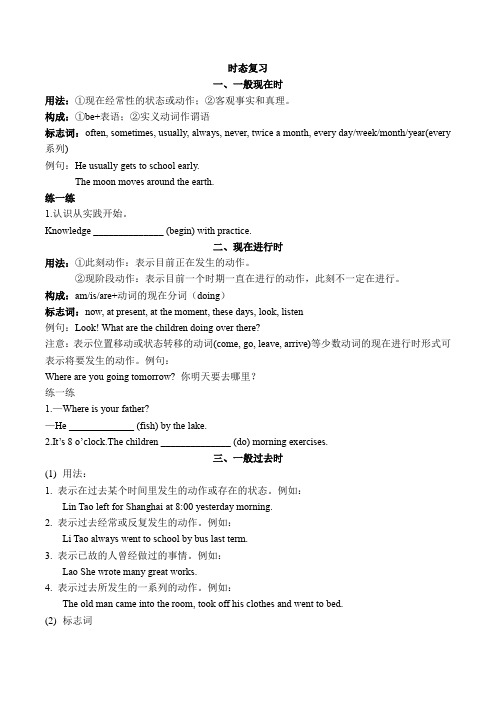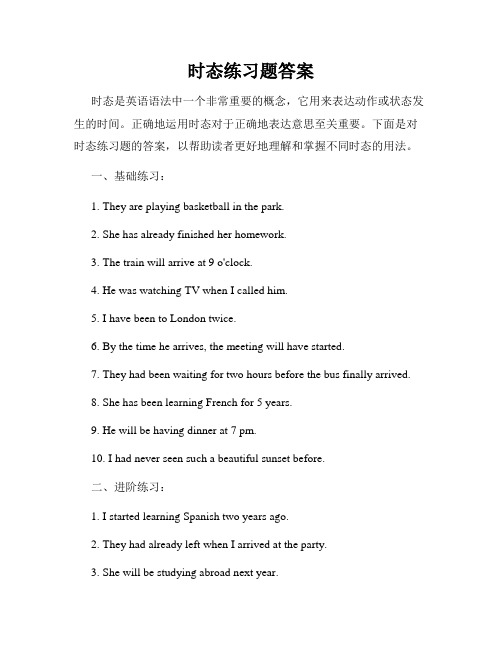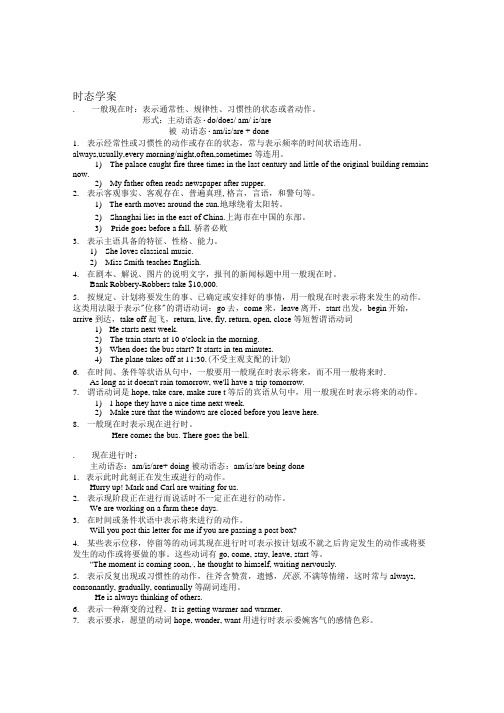时态学案答案
高二英语学考时态复习学案5完成时

动词时态Ⅴ:完成时一. 基础巩固例一:单句语法填空1. Great changes (take) place in my hometown since 1978. 自从1978年以来,我的家乡发生了很大的变化。
2. We (see) him for two days. 我们两天没看见他了。
3. I’m very tired. I (check) the students’ papers all the morning. 我很累。
我整个上午都在批改学生的试卷。
4. I (call) him many times this morning, but there’s no answer.我从上午到现在一直给他打,打了很多次但都没有回应。
5. When I got to the station, the train (leave). 当我到达车站时,火车已经开走了。
6. By the end of last week, they (plete) the bridge. 到上周为止,他们建好了这座桥。
练习一:(1). 写出下列动词的过去式、过去分词1. see2. be3. bee4. begin5. build6. go7. give8. lose9. make 10. say 11. mean 12. buy13. read 14. think 15. break 16. do(2). 翻译1. 我们在五中读了三年书。
2. 自从2005年以来,我一直在这儿工作。
3. 当他到达飞机场时,飞机已经起飞了。
二. 用法点睛★现在完成时例一:单句语法填空1. So far this year, we (see) a fall in house prices by between 5 and 10 percent.2. The construction of the two railway lines (plete) by now.3. In the last few years, thousands of films (produce) all over the world.4. His first novel (receive) good reviews since it came out last month.总结一:1. 现在完成时的结构,现在完成时的被动语态的结构;2. 现在完成时的标志词。
英语时态习题答案

英语时态习题答案The Answers to English Tense ExercisesIn this article, we will go through the answers to some English tense exercises to help you understand and improve your grasp of the different tenses in the English language.Exercise 1: Present Simple or Present Continuous1. am playing2. watches3. do4. is studying5. speaks6. go7. are reading8. does9. are having10. isIn this exercise, we were required to choose between the present simple and present continuous tense. The present simple tense is used to talk about habitual or regular actions, while the present continuous tense is used to talk about actions happening at the moment of speaking or temporary actions. For example, "I play tennis every Sunday" uses the present simple tense to talk about a regular action, while "I am playing tennis right now" uses the presentcontinuous tense to talk about an action happening at the moment of speaking. Exercise 2: Past Simple or Past Continuous1. was reading2. went3. were playing4. saw5. was studying6. were having7. wrote8. was9. did10. wereIn this exercise, we had to choose between the past simple and past continuous tense. The past simple tense is used to talk about completed actions in the past, while the past continuous tense is used to talk about actions that were in progress at a specific point in the past. For example, "I read a book yesterday" uses the past simple tense to talk about a completed action, while "I was reading a book when the phone rang" uses the past continuous tense to talk about an action that was in progress when another action occurred.Exercise 3: Future Simple or Future Continuous1. will be2. will have3. are going to4. will be5. will be6. will have7. will be8. will be9. will be10. will beIn this exercise, we had to choose between the future simple and future continuous tense. The future simple tense is used to talk about actions that will happen in the future, while the future continuous tense is used to talk about actions that will be in progress at a specific point in the future. For example, "I will go to the beach next weekend" uses the future simple tense to talk about a future action, while "I will be sunbathing at the beach this time next week" uses the future continuous tense to talk about an action that will be in progress at a specific point in the future.By going through these exercises and their answers, you can improve your understanding of the different tenses in English and use them more accurately in your own writing and speaking. Keep practicing to master the various tenses and become a more fluent and confident English speaker.。
最新中考人教版九年级英语语法专练学案七动词时态(有答案)

中考人教版九年级英语语法专练学案七动词时态(有答案)一、关于考点一般现在时、一般过去时、一般将来时、过去将来时、现在进行时、过去进行时、现在完成时、过去完成时。
二、关于用法9.一般将来时态:表示将来存在的状态(be动词),将来经常做的动作I will do it. 我将要做这件事。
10.将来进行时态:表示将来正在进行的动作I will be doing it. 我将要正在做这件事。
11.将来完成时态:表示到将来的某个时间已经完成,对那个时间产生影响,形成结果I will have done it. 我(到将来的某个时间)已经做完这件事了。
12.将来完成进行时态:表示将来一直在进行的动作(字面意思已经在进行)I will have been doing it. 我(到将来的某个时间)将一直在做这件事。
Ⅳ过去将来时态:四种(平时根本用不到,只在讲故事或小说中出现)13.一般过去将来时态:表示对过去的某一时间来讲的将来存在的状态(be动词),将来经常做的动作,对现在来讲已成过去I would do it.14.过去将来进行时态:表示对过去的某一时间来讲的将来正在进行的动作,对现在来讲已成过去I would be doing it.15.过去将来完成时态:表示对过去的某一时间来讲的到将来的某个时间已经完成,对那个时间产生影响,形成结果,对现在来讲已成过去I would have done it.16.过去将来完成进行时态:表示对过去的某一时间来讲的将来一直在进行的动作(字面意思已经在进行),对现在来讲已成过去I would have been doing it.一般现在时主要用于下面几情况:1)描述当前时间内经常出现、反复发生的动作或存在的状态。
They raise ducks as a sideline .他们以养鸭为副业。
2)仅为了描述状态、性质、特征、能力等等。
这里的目的是为了"描述现阶段的动作或状态",其重点"不是强调动作发生的时间、或进行的状态"。
中考英语时态复习学案一般现在时、现在进行时、一般过去时

时态复习一、一般现在时用法:①现在经常性的状态或动作;②客观事实和真理。
构成:①be+表语;②实义动词作谓语标志词:often, sometimes, usually, always, never, twice a month, every day/week/month/year(every 系列)例句:He usually gets to school early.The moon moves around the earth.练一练1.认识从实践开始。
Knowledge ______________ (begin) with practice.二、现在进行时用法:①此刻动作:表示目前正在发生的动作。
②现阶段动作:表示目前一个时期一直在进行的动作,此刻不一定在进行。
构成:am/is/are+动词的现在分词(doing)标志词:now, at present, at the moment, these days, look, listen例句:Look! What are the children doing over there?注意:表示位置移动或状态转移的动词(come, go, leave, arrive)等少数动词的现在进行时形式可表示将要发生的动作。
例句:Where are you going tomorrow? 你明天要去哪里?练一练1.—Where is your father?—He _____________ (fish) by the lake.2.It’s 8 o’clock.The children ______________ (do) morning exercises.三、一般过去时(1)用法:1. 表示在过去某个时间里发生的动作或存在的状态。
例如:Lin Tao left for Shanghai at 8:00 yesterday morning.2. 表示过去经常或反复发生的动作。
英语动词的时态练习及答案详解 含答案推荐精选

英语动词的时态练习及答案详解含答案推荐精选一、初中英语动词的时态1.— What are you doing now, Kate?— I an email to my friend.A.write B.am writing C.wrote D.have written【答案】B【解析】句意:——凯特你在做什么?——我正在给我的朋友写电子邮件。
考查现在进行时。
根据What are you doing now, Kate?可知是问正在做什么,现在进行时态,所以回答也应用现在进行时,其构成为be+动词现在分词;主语是I,所以系动词be用am,write的现在分词是writing,故答案选B。
2.--- Where’s my father? Could tell me?--- He to Beijing. He’ll attend an important meeting.A.goes B.is going C.has gone D.has been【答案】C【解析】【详解】句意:——我的父亲在哪里?可以告诉我吗?——他已经去北京了。
他将参加一个重要会议。
考查动词时态辨析。
根据句意语境,可知父亲不在说话的地点已经去了北京,需用现在完成时,可排除AC两项。
have been to意为“曾经去过某地”,现在已不在那里了;have gone to意为“到某地去了”,说话时作句子主语的人不在现场,故选C。
3.—You look unhappy. What’s wrong?—No one ______ me when I was in America. Maybe they all forgot me.A.phoned B.phones C.has phoned D.had phoned【答案】A【解析】句意:-你看起来不开心,怎么了?-当我在美国的时候没有人给我打电话,可能他们都忘了我吧!题干有过去的时间状语when I was in America,需要用一般过去时态用来描述过去的一个动作。
时态练习题答案

时态练习题答案时态是英语语法中一个非常重要的概念,它用来表达动作或状态发生的时间。
正确地运用时态对于正确地表达意思至关重要。
下面是对时态练习题的答案,以帮助读者更好地理解和掌握不同时态的用法。
一、基础练习:1. They are playing basketball in the park.2. She has already finished her homework.3. The train will arrive at 9 o'clock.4. He was watching TV when I called him.5. I have been to London twice.6. By the time he arrives, the meeting will have started.7. They had been waiting for two hours before the bus finally arrived.8. She has been learning French for 5 years.9. He will be having dinner at 7 pm.10. I had never seen such a beautiful sunset before.二、进阶练习:1. I started learning Spanish two years ago.2. They had already left when I arrived at the party.3. She will be studying abroad next year.4. We have been waiting for the bus for over an hour.5. By the end of this month, I will have completed my project.6. He didn't know how to swim until he took swimming lessons last summer.7. She has been working as a teacher since she graduated from college.8. When I saw him yesterday, he had just come back from his business trip.9. They will have finished the construction of the new building by next month.10. The movie had already started when we got to the cinema.三、高级练习:1. By the time he arrives, we will have finished our meeting.2. She has never ridden a horse before.3. They will have been married for 10 years in August.4. He wishes he had studied harder for the exam.5. I have been waiting for the package for two weeks already.6. By the time you wake up, I will have already gone to work.7. She had been living in Paris for five years before she moved to London.8. They will be lying on the beach this time tomorrow.9. I have known him since we were in elementary school.10. When I saw her yesterday, she had just come back from her vacation.这些是题目“时态练习题答案”的答案。
英语时态时态学案.doc

时态学案.一般现在时:表示通常性、规律性、习惯性的状态或者动作。
形式:主动语态・do/does/ am/ is/are被动语态・am/is/are + done1.表示经常性或习惯性的动作或存在的状态,常与表示频率的时间状语连用。
always,usually,every morning/night,often,sometimes 等连用。
1)The palace caught fire three times in the last century and little of the original building remains now.2)My father often reads newspaper after supper.2.表示客观事实、客观存在、普遍真理,格言,言语,和警句等。
1)The earth moves around the sun.地球绕着太阳转。
2)Shanghai lies in the east of China.上海市在中国的东部。
3)Pride goes before a fall. 骄者必败3.表示主语具备的特征、性格、能力。
1)She loves classical music.2)Miss Smith teaches English.4.在剧本、解说、图片的说明文字,报刊的新闻标题中用一般现在时。
Bank Robbery-Robbers take $10,000.5.按规定、计划将要发生的事、已确定或安排好的事情,用一般现在时表示将来发生的动作。
这类用法限于表示"位移"的谓语动词:go去,come来,leave离开,start出发,begin开始,arrive 到达,take off 起飞,return, live, fly, return, open, close 等短暂谓语动词1)He starts next week.2)The train starts at 10 o'clock in the morning.3)When does the bus start? It starts in ten minutes.4)The plane takes off at 11:30.(不受主观支配的计划)6.在时间、条件等状语从句中,一般要用一般现在时表示将来,而不用一般将来时.As long as it doesn't rain tomorrow, we'll have a trip tomorrow.7.谓语动词是hope, take care, make sure t等后的宾语从句中,用一般现在时表示将来的动作。
时态练习题答案及解析

时态练习题答案及解析时态是英语语法中一个非常重要的部分,正确使用时态可以使我们的表达更加准确、流畅。
下面是一些时态练习的答案及解析,希望能对大家的学习有所帮助。
练习题一:1. I (read) the book last night.答案:read解析:句子中的时间状语“last night”表明动作发生在过去,所以需要用过去时态。
2. John often (go) to the gym.答案:goes解析:句子中的时间状语“often”表明这个动作是习惯性的,所以需要用一般现在时。
3. He (study) for two hours yesterday.答案:studied解析:句子中的时间状语“yesterday”表明动作发生在过去,所以需要用过去时态。
4. They (have) breakfast when I arrived.答案:were having解析:句子中的时间状语“when I arrived”表明动作正在进行,用过去进行时。
5. We (go) to the beach every summer.答案:go解析:句子中的时间状语“every summer”表明这个动作是习惯性的,所以需要用一般现在时。
练习题二:1. She (watch) TV when I called her.答案:was watching解析:句子中的时间状语“when I called her”表明动作正在进行,用过去进行时。
2. They (travel) to Europe last year.答案:traveled解析:句子中的时间状语“last year”表明动作发生在过去,所以需要用过去时态。
3. He (play) soccer every Saturday.答案:plays解析:句子中的时间状语“every Saturday”表明这个动作是习惯性的,所以需要用一般现在时。
4. We (have) dinner at 7 o'clock yesterday.答案:had解析:句子中的时间状语“yesterday”表明动作发生在过去,所以需要用过去时态。
- 1、下载文档前请自行甄别文档内容的完整性,平台不提供额外的编辑、内容补充、找答案等附加服务。
- 2、"仅部分预览"的文档,不可在线预览部分如存在完整性等问题,可反馈申请退款(可完整预览的文档不适用该条件!)。
- 3、如文档侵犯您的权益,请联系客服反馈,我们会尽快为您处理(人工客服工作时间:9:00-18:30)。
英语动词时态和语态讲解动词是谓语动所表示的动作或情况发生时间的各种形式。
英语动词有16种时态,但是常用的只有9种:一般现在时、一般过去时、一般将来时、现在进行时、过去进行时、现在完成时、过去完成时、过去将来时、现在完成进行时。
下面分别介绍。
1、一般现在时的用法1)表示经常性、习惯性的动作;表示现在的状态、特征和真理。
句中常用often, usually, every…,sometimes 等时间状语。
例如:a. He goes to school every day.b. He is very happy.c. The earth moves around the sun.2)在时间状语从句和条件状语从句中,用一般现在时表示将来。
例如:a. If you come this afternoon, we’ll have a meeting.b. When I graduate, I’ll go to countryside.3)下列动词come, go, arrive, leave, start, begin, return的一般现在时可以表示将来,主要用来表示在时间上已确定或安排好的事情。
例如:a.The train leaves at six tomorrow morning. 火车明天上午六点开。
b.When does the bus star? It stars in ten minutes. 汽车什么时候开?十分钟后。
2)以here, there等开始的倒装句,表示动作正在进行。
例如:a.Here comes the bus. = The bus is coming. 车来了。
b.There goes the bell. = The bell is ringing. 铃响了。
4)表示状态和感觉的动词(be, like, hate, think, remember, find, sound 等)常用一般现在时。
a. I like English very much.b. The story sounds very interesting.5)书报的标题、小说等情节介绍常用一般现在时。
2、一般过去时的用法1)在确定的过去时间里所发生的动作或存在的状态。
例如:时间状语有:yesterday, last week, an hour ago, the other day, in 1982等。
例如:Where did you go just now?2)表示在过去一段时间内,经常性或习惯性的动作。
例如:When I was a child, I often played football in the street.Whenever the Browns went during their visit, they were given a warm welcome.3)句型:a.It is time for sb. to do sth例如:It is time for you to go to bed.b.it is time that sb. did sth.例如It is time you went to bed.4)wish, wonder, think, hope 等用过去时,作试探性的询问、请求、建议等,而一般过去时表示的动作或状态都已成为过去,现已不复存在。
例如:I thought you might have some.3.一般将来时的用法一般将来时表示将来的动作或状态。
1)― will 或shall + 动词原形‖表示即将发生的或最近打算进行的事。
a.It is going to rain.b.We are going to have a meeting today.2)―be to + 动词原形‖ 表示按计划进行或征求对方意见。
a.The boy is to go to school tomorrow. 男孩明天要去上学。
b.Are we to go on with this work? 我们要继续这项工作吗?3)―be about to+ 动词原形‖ 表示即将发生的动作,意为be ready to do sth. 后面一般不跟时间状语。
We are about to leave. 我们正要离开。
4) go , come , start, move, sail, leave, arrive ,stay 等可用进行时态表示按计划即将发生的动作。
例如:I’m leaving for Beijing. 我要离开北京了。
我们重点学习一下,be to和be going tobe to 表示客观安排或受人指示而做某事,be going to 表示主观的打算或计划。
例如:I am to play football tomorrow afternoon. 明天下午我去踢球。
(客观安排)I'm going to play football tomorrow afternoon.明天下午我想去踢球。
(主观安排)4、现在进行时表说话时或目前一段时间内正在进行的活动:或表感情色彩,加强语气。
与频率副词,如always,constantly,continually,again等连用表示说话人的某种感情色彩(赞叹、厌烦、埋怨等)。
We are having English class.The house is being built these days.The little boy is always making trouble.注意一:在时间状语或条件状语从句中表示将来正在进行的动作。
Look out when you are crossing the street.Don't wake him up if he is still sleeping at 7 tomorrow morning.注意二:表示在最近按计划或安排要进行的动作(这时多有表示将来的时间状语)。
Marry is leaving on Friday.5. 现在完成时现在完成时用来表示之前已发生或完成的动作或状态,其结果的影响现在还存在;也可表示持续到现在的动作或状态。
其构成:have(has)+过去分词。
重点:比较一般过去时与现在完成时1)一般过去时表示过去某时发生的动作或单纯叙述过去的事情,强调动作;现在完成时为过去发生的,强调过去的事情对现在的影响,强调的是影响。
2)一般过去时常与具体的时间状语连用,而现在完成时通常与模糊的时间状语连用,或无时间状语。
一般过去时的时间状语:yesterday, last week,…ago, in1980, in October, justnow等,皆为具体的时间状语。
现在完成时的时间状语:for, since, so far, ever, never, just, yet, till/until, up to now, in past years, always等,皆不确定的时间状语。
共同的时间状语:this morning, tonight, this April, now, already, recently, lately 等。
例如:a.I saw this film yesterday. (强调看的动作发生过了)b.I have seen this film. (强调对现在的影响,电影的内容已经知道了)c.Why did you get up so early? (强调起床的动作已发生过了)d.Who hasn't handed in his paper? (强调有卷子未交,疑为不公平竞争)e.He has been in the League for three years. (在团内的状态可延续)f.He has been a League member for three years. (是团员的状态可持续)句子中如有过去时的时间副词(如yesterday, last, week, in 1960)时,不能使用现在完成时,要用过去时。
(错)Tom has written a letter to his parents last night.(对)Tom wrote a letter to his parents last night.用于现在完成时的句型1)It is the first / second time.... that…结构中的从句部分,用现在完成时。
例如:It is the first time that I have visited the city.This is the first time (that)I've heard him sing.注意:It was the third time that the boy had been late.2)This is +形容词最高级+that…结构,that 从句要用现在完成时。
例如:This is the best film that I've (ever)seen.典型例题(1)---Do you know our town at all? ---No, this is the first time I ___ here.A. wasB. have beenC. cameD. am coming(2)---Have you ____ been to our town before? ---No, it's the first time I ___ here.A. even, comeB. even, have comeC. ever, comeD. ever, have come6. 现在完成进行时表示从过去某时起,一直延续到现在的动作,这个动作到现在刚刚停止或仍继续进行下去。
构成:have/has been doing常用时间状语:for+时间段,since +过去时间点,since+一般过去时从句,these days/years, this morning/week/month/year, recently, lately, in the past/last…时间段等,或是上下文暗示I've been waiting for you for the whole morning. (到现在刚结束)It has been raining for three days.(有可能还在继续下)China has been developing in the past 60 years. (还在继续发展)Doctors have been trying to find ways to cure cancers.(依然在进行)--Where have you been? I have been looking for you.(动作刚结束)She has been teaching English since she graduated. (动作还在继续)7.. 过去完成时1)概念:表示过去的过去其构成是had +过去分词构成。
